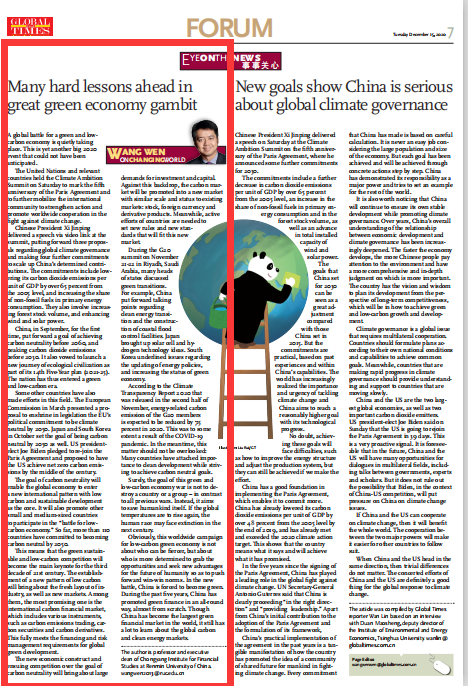Commentaries
Your Present Location: Teacher_Home> Wang Wen> CommentariesWang Wen: Many hard lessons ahead in great green economy gambit
By: Wang Wen Source: Global Times Published: 2020-12-14

A global battle for a green and low-carbon economy is quietly taking place. This is yet another big 2020 event that could not have been anticipated.
The United Nations and relevant countries held the Climate Ambition Summit on Saturday to mark the fifth anniversary of the Paris Agreement and to further mobilize the international community to strengthen action and promote worldwide cooperation in the fight against climate change.
Chinese President Xi Jinping delivered a speech via video link at the summit, putting forward three proposals regarding global climate governance and making four further commitments to scale up China's determined contributions. The commitments include lowering its carbon dioxide emissions per unit of GDP by over 65 percent from the 2005 level, and increasing the share of non-fossil fuels in primary energy consumption. They also involve increasing forest stock volume, and enhancing wind and solar power.
China, in September, for the first time, put forward a goal of achieving carbon neutrality before 2060, and peaking carbon dioxide emissions before 2030. It also vowed to launch a new journey of ecological civilization as part of its 14th Five-Year plan (2021-25). The nation has thus entered a green and low-carbon era.
Some other countries have also made efforts in this field. The European Commission in March presented a proposal to enshrine in legislation the EU's political commitment to be climate neutral by 2050. Japan and South Korea in October set the goal of being carbon neutral by 2050 as well. US president-elect Joe Biden pledged to re-join the Paris Agreement and proposed to have the US achieve net zero carbon emissions by the middle of the century.
The goal of carbon neutrality will enable the global economy to enter a new international pattern with low carbon and sustainable development as the core. It will also promote other small and medium-sized countries to participate in the "battle for low-carbon economy." So far, more than 110 countries have committed to becoming carbon neutral by 2050.
This means that the green sustainable and low-carbon competition will become the main keynote for the third decade of 21st century. The establishment of a new pattern of low carbon will bring about the fresh layout of industry, as well as new markets. Among them, the most promising one is the international carbon financial market, which includes various instruments, such as carbon emissions trading, carbon securities and carbon derivatives. This fully meets the financing and risk management requirements for global green development.
The new economic construct and ensuing competition over the goal of carbon neutrality will bring about large demands for investment and capital. Against this backdrop, the carbon market will be promoted into a new market with similar scale and status to existing markets: stock, foreign currency and derivative products. Meanwhile, active efforts of countries are needed to set new rules and new standards that will fit this new market.
During the G20 summit on November 21-22 in Riyadh, Saudi Arabia, many heads of states discussed green transitions. For example, China put forward talking points regarding clean energy transition and the construction of coastal flood control facilities. Japan brought up solar cell and hydrogen technology ideas. South Korea underlined issues regarding the updating of energy policies, and increasing the status of green economy.
According to the Climate Transparency Report 2020 that was released in the second half of November, energy-related carbon emission of the G20 members is expected to be reduced by 7.5 percent in 2020. This was to some extent a result of the COVID-19 pandemic. In the meantime, this matter should not be overlooked: Many countries have attached importance to clean development while striving to achieve carbon neutral goals.
Surely, the goal of this green and low-carbon economy war is not to destroy a country or group - in contrast to all previous wars. Instead, it aims to save humankind itself. If the global temperatures are to rise again, the human race may face extinction in the next century.
Obviously, this worldwide campaign for low-carbon green economy is not about who can be fiercer, but about who is more determined to grab the opportunities and seek new advantages for the future of humanity so as to push forward win-win norms.
In the new battle, China is forced to become green. During the past five years, China has promoted green finance in an all-round way, almost from scratch. Though China has become the largest green financial market in the world, it still has a lot to learn about the global carbon and clean energy markets.
The author is professor and executive dean of Chongyang Institute for Financial Studies at Renmin University of China. wangwen2013@ruc.edu.cn
Please Find us : Facebook: RDCYINST Twitter: RDCYINST LinkedIn: 人大重阳RDCY Instagram:rdcyinst























































































 京公网安备 11010802037854号
京公网安备 11010802037854号





